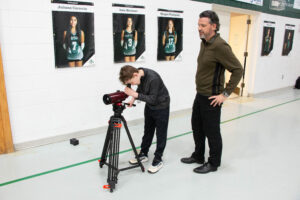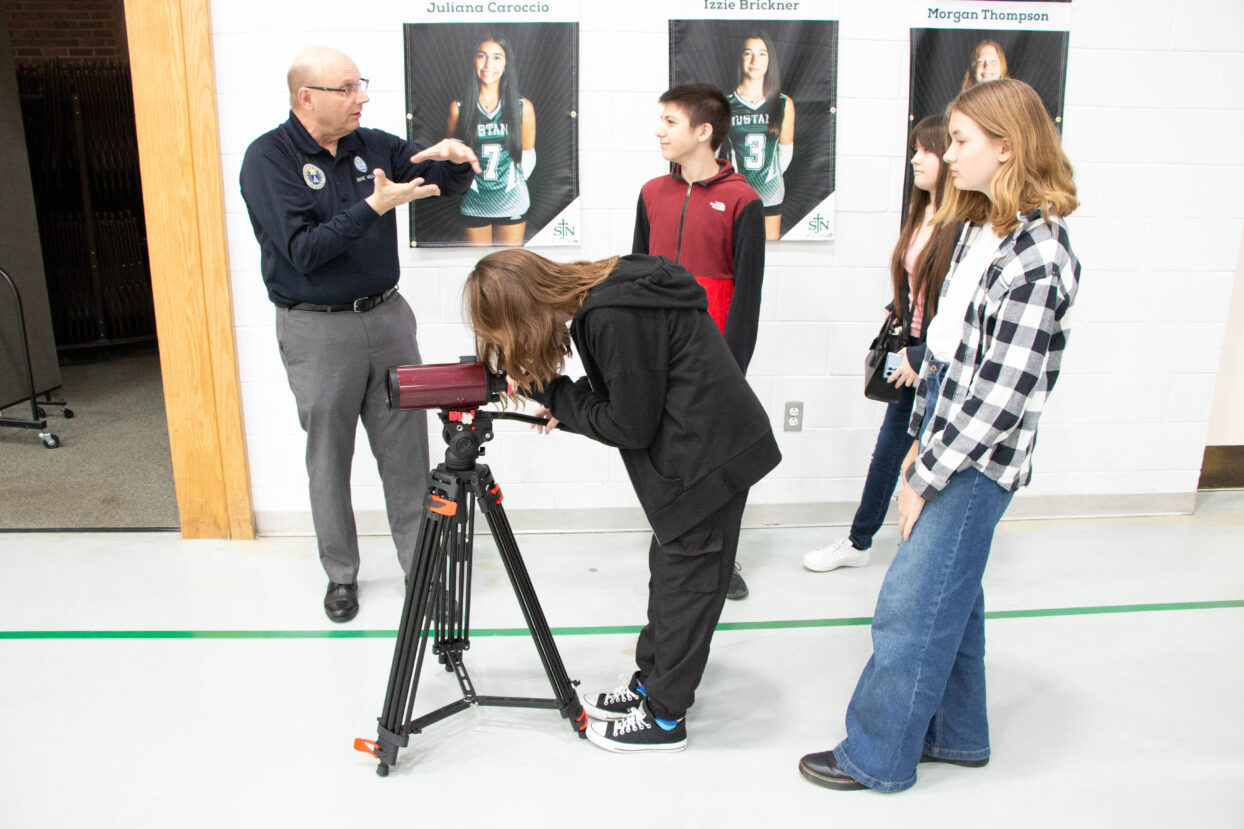Students (and parents) get hands-on experience at St. John Neumann School as they explore space
By Bill Brewer
The 2025 version of the STAR Ex camp did not disappoint when it came to engaging young students in the wonders of space exploration, astronomy, rocketry, telescopes, robotics, satellites, rovers, and drones.
In fact, the more than 30 students who attended the daylong camp at St. John Neumann School in Farragut on April 12 were treated to one-on-one dialogue with astronaut John Shoffner and astronomy experts Brother Guy Consolmagno, SJ, and Dr. Jonathan Lunine as well as hands-on experience to hone their skills in science, technology, engineering, art, and mathematics.
Mr. Shoffner, a Knoxvillian, served as the pilot on the Axiom Space Ax-2 mission to the International Space Station in May 2023. It was the second entirely private crew mission to the International Space Station.
Mr. Shoffner appeared in person at St. John Neumann to meet with the students and share his out-of-this-world experiences.
Brother Guy is an American research astronomer, physicist, and Jesuit brother who was selected by Pope Francis in September 2015 to be director of the Vatican Observatory, an astronomical research and education institution supported by the Holy See.
Dr. Lunine is the chief scientist for NASA’s Jet Propulsion Laboratory in California. He is a planetary scientist and physicist, and his research centers on planet formation and habitability.
And Dr. Greg Snyder, NASA’s solar system ambassador, gave a presentation on space exploration in the past, present, and future.
In a rare occasion, STAR Ex organizer Dave Wells was able to include the students in a private, regularly scheduled Zoom meeting that Brother Consolmagno holds with Dr. Lunine and other world experts on astronomy.
The scientists on the Zoom call were from Michigan, California, Arizona, North Carolina, New York, Wisconsin, Connecticut, and Germany.
Brother Guy began the meeting by asking the participating scientists to introduce themselves, tell where they currently were located, what the temperature was, and what they had most recently observed in the sky.
Those introductions served as a quick lesson for the young students that even adult scientists are still wowed by the weather and what is up in the sky.
Brother Guy described his work as the Vatican’s top astronomer and his collaboration with the brightest minds in the world in studying the heavens.
Dr. Lunine, through his presentation, explained to the students the role of the Jet Propulsion Lab in space exploration and the science of rocketry. The lab is directly involved in past, present, and future space missions.
In their discussion, Brother Guy and Dr. Lunine talked about the Pontifical Academy of Science and the world’s brightest scientific minds that have contributed discourse on the study of planets and space exploration at the academy.
“The who’s who of astronomy in those days gathered at the Vatican to debate the population of stars and why some stars are different from others,” Brother Guy said. “But the implications of the populations of stars basically showed the world that the universe was changing over time and wasn’t in a steady state.”
“There were some remarkable scientists all together there,” Dr. Lunine added.
Dr. Lunine took questions from the STAR Ex students and others. One question asked of him was if there is anything he has seen, studied, or conversed about that made him think he was witnessing the face of God.

Oscar Kahler takes part in a planetary exercise in the St. John Neumann School gym as part of the STAR Ex camp on April 12. Oscar’s father, Glenn, stands ready to look through the telescope. (Photo Bill Brewer)
“I see the face of God in everything, not only the things in the universe that I study but in every person. Every person is the face of Christ, and it has taken me decades to come to learn that. I’m a slow learner. It takes me awhile to get things. It took me decades to decide that I really was a Christian and a Catholic Christian, even though I had hints of that when I was a teenager,” Dr. Lunine said.
The campers truly experienced brushes with greatness in the STEAM fields, and they appeared excited to be taking part.
Mr. Wells was accompanied by a team from the Civil Air Patrol that assisted the boys and girls in soaring into the wild blue yonder without leaving the St. John Neumann campus.
The campers were exposed to a variety of telescopes they used to identify parts of the solar system.
And to test their knowledge from the day, they produced homemade, rubberband-propelled rockets made from Nerf-like foam. They watched in amazement as their rockets shot across the school lunchroom and then outside across the school parking lot.
It was a hands-on experiment in energy, propulsion, geometry, physics, motion—and fun.
Mr. Wells explained that in 2017 he attended a weeklong faith and astronomy workshop in Arizona led by Brother Guy.
“That really kicked my interest in space and astronomy into overdrive. It has really become a passion of mine since then,” Mr. Wells said, noting that he is part of the monthly Zoom calls with Brother Guy and scientists from around the world.
He explained that “the stars have aligned” when he found out that a Zoom meeting with Brother Guy was on the day of the STAR Ex camp, and Brother Guy liked the idea of including the St. John Neumann campers on the call.
“There is a relationship between faith and science. You do not have to be all one or the other. They are in dialogue with each other. They learn from each other. There are passionate scientists who are deeply religious people, and there are passionate religious people who are deeply scientific as well. That’s a tradition we have that I want to continue to build on. I think it is exciting, I really do,” Mr. Wells said.
Mr. Wells pointed out that there is a resurgence in interest in astronomy and space exploration, with so many recent missions into space by NASA and Space X, the International Space Station, and efforts to possibly land on Mars.
“We are in a moment in our history where we have to take the next step. And we have to do it in cooperation with countries around the world. The days of the space race are behind us. We have to learn how to work with each other,” he said. “We are all on one planet, and we have to work together. I think the International Space Station is a great example of countries working together. We need to see more of that, and I think that is going to be the wave of the future.”
Mr. Wells firmly believes that the first person to walk on Mars is alive today, and that someone is likely the age of the STAR Ex campers.
“They are going to be part of the generation that not only watches it happen but helps to make it happen,” he said.
Mr. Wells also is excited about developments in astronomy that are fueling excitement in space exploration. He cited the Hubble telescope that has given rise to the James Webb space telescope and other telescopes that are going into space.
“Our understanding of the mysteries of the universe and the cosmos is going to grow at an astronomical pace. It will be amazing what we are going to discover in the next 10, 15, 20 years. These young people will be in college studying all of that, and they will be aware of all the new discoveries that are happening,” Mr. Wells said.
Not only is that Mr. Wells’ passion, he considers it a vocation.
“My job is to ignite the imagination of these young people. That imagination is the rocket fuel that is going to take us into the future,” he said.
In May, Mr. Wells was named the squadron commander of the Sunsphere Civil Air Patrol cadet squadron. He said the squadron’s motto is “Aim for the stars.”
Glenn Kahler, who serves as director of music and liturgy for the Cathedral of the Most Sacred Heart of Jesus, was among the parents accompanying their children during the daylong camp.
The camp piqued his curiosity and also is an activity that he thought his son, Oscar, would enjoy.
“He’s always been really interested in space and exploration, science fiction. He has had a mind for it his entire life. And we have not had an experience like this before in Knoxville that was available to us,” Mr. Kahler said.
Mr. Kahler was certain that Oscar was excited to be attending STAR Ex camp.
“I would say he was having a life-altering experience. He had the fire to begin with, but I think the camp is stoking that fire,” he said.
Oscar, who attends Sacred Heart Cathedral School, shared his excitement about the camp.
“The whole day was awesome, but my favorite part was meeting astronaut John Shoffner,” Oscar said. “I learned about how astronauts live in space; how they sleep, eat, and spend their time.”
And the Zoom call with the world’s leading space scientists was an added bonus for Oscar.
“It was a surprise. It made my experience even more memorable. They gave us more information than I expected,” he said.
And Oscar took full advantage of the opportunity by asking the scientists a question during the call.
And just what was Oscar’s question? “Do you believe that there is intelligent life on Jupiter’s moon, Europa?” The scientists explained that continued studies of the solar system are revealing more details about the possibility of life on other planets.
Oscar’s dad said it was “surreal” that the chief scientist for NASA’s Jet Propulsion Laboratory answered Oscar’s question.
“As a family, we all know these people. We’ve seen them on all the scientific shows and planetary exploration shows. But to have a moment in time where we can reach across the planet in real time and have a question answered by people leading the industry is just surreal,” Mr. Kahler said.
Oscar is planning a return visit to STAR Ex next year. “Absolutely, it was a blast,” he said.
Mr. Wells’ passion and vocation is apparently having an impact on students like Oscar, who could be the next generation that Mr. Wells was referring to.
Asked if he would like to be involved in space and aeronautics when he graduates from college, Oscar, said, “Absolutely. In fact, I plan to become an astronaut!”
Maj. David Hoover with the Tennessee Civil Air Patrol said STEAM kits for students used in special programs like the STAR Ex camp are available to all schools. The kits are available for different grades from kindergarten through high school.
Maj. Hoover, who serves as aerospace education officer for the Sunsphere Cadet Squadron, said the Civil Air Patrol would like to distribute the kits to as many schools as possible to complement academic curriculum and give students hands-on activities.
For information about the kits, contact Major Hoover at David.Hoover@tncap.us.

